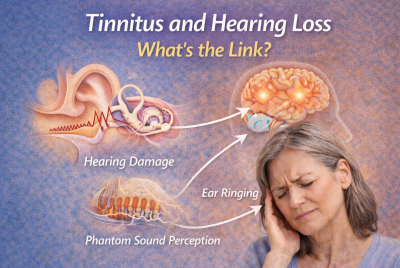B12 Tinnitus
Explore the potential link between Vitamin B12 and tinnitus relief. Dive deep into research, personal tips, and expert advice on B12 tinnitus. Learn how B12 supplementation could be a game-changer in managing your tinnitus symptoms. Don’t miss out on expert insights and actionable advice! As someone deeply passionate about hearing health, I can’t emphasize enough the pivotal role that vitamin B12 plays in maintaining optimal auditory function. My journey through understanding the intricate relationship between B12 deficiency and tinnitus has led me to share invaluable insights for anyone seeking relief and enhancement of their hearing experience.
What Is Tinnitus?
Tinnitus is a condition characterized by a ringing or buzzing sound in the ears when there’s actually no external sound source. Ever experienced that annoying ringing sound when it’s super quiet? That’s tinnitus for you.
Symptoms Of Tinnitus
Tinnitus manifests as persistent ringing or buzzing sounds in the ears, affecting daily life and concentration. Individuals often describe these noises as intrusive and distracting. Medical experts link tinnitus to various factors, including exposure to loud noises, ear infections, and age-related hearing loss. Seeking professional medical advice is crucial for accurately diagnosing and managing tinnitus symptoms, enabling individuals to regain control over their auditory experience.
Common Causes Of Tinnitus
Exposure to loud environments, such as concerts or machinery noise, can trigger tinnitus. Earwax blockages and ear infections also contribute. Age-related hearing loss, stemming from natural wear and tear of auditory structures, is a common factor. Additionally, high blood pressure and certain medications can induce tinnitus. Identifying these causes empowers individuals to make informed choices regarding their hearing health and seek appropriate interventions to mitigate tinnitus effects.
B12 And Tinnitus
Vitamin B12 is gaining attention for its potential to alleviate tinnitus symptoms. Particularly in cases of B12 deficiency, supplementation may offer relief.
What is Vitamin B12?
Vitamin B12 is an essential nutrient your body needs but cannot produce. It plays a vital role in keeping your nerves healthy, aiding in the production of DNA, and working with other B vitamins to form red blood cells. You can primarily find it in animal products, like meat and dairy, but it’s also available as a supplement and in fortified foods.
Can B12 Cause Tinnitus?
There’s no strong evidence to suggest that Vitamin B12 directly causes tinnitus. In fact, some studies indicate that B12 supplementation might help alleviate tinnitus symptoms, especially in people with a B12 deficiency. However, it’s essential to consult a healthcare provider for proper diagnosis and treatment. Excessive B12 supplementation can have side effects, but these typically don’t include tinnitus.
B12 Deficiency Tinnitus
Understanding B12 Deficiency And Tinnitus
Let’s start by unraveling the mystery behind B12 deficiency and its connection to tinnitus. Vitamin B12, a water-soluble nutrient, is essential for nerve function, red blood cell formation, and DNA synthesis. Tinnitus, often characterized by ringing or buzzing sounds in the ears, can be exacerbated by B12 deficiency due to its impact on the auditory nerves.
The Importance Of B12 For Hearing Health
The significance of B12 in hearing health cannot be overstated. This vitamin supports the myelin sheath that insulates nerve fibers, facilitating the smooth transmission of signals from the ears to the brain. A deficiency in B12 can lead to nerve damage and hearing disturbances, making it a crucial factor in tinnitus development.
Identifying B12 Deficiency
Recognizing the signs of B12 deficiency is the first step towards alleviating tinnitus. Fatigue, dizziness, and cognitive fog are common indicators. Surprisingly, these symptoms often overlap with those of tinnitus. Connecting the dots between these symptoms and a potential deficiency can offer insights into effective solutions.
Addressing B12 Deficiency-Related Tinnitus
Taking charge of your hearing health involves making dietary adjustments and considering supplements. Foods rich in B12, such as fish, eggs, and fortified cereals, can contribute significantly to your daily intake. However, to ensure consistent and optimal levels, supplements might be necessary, especially for individuals with absorption issues.
Consulting A Healthcare Professional
While B12 supplementation is accessible, seeking professional guidance is paramount. A healthcare provider can conduct tests to assess your B12 levels accurately and recommend appropriate dosages. This tailored approach addresses your unique needs and avoids unnecessary guesswork.
Lifestyle Changes For Better Hearing Health
Managing stress is another pivotal aspect of tinnitus management. Stress can exacerbate tinnitus, creating a vicious cycle. Incorporating stress-reduction techniques like meditation, deep breathing, and mindfulness can bring relief. Additionally, maintaining a balanced diet rich in antioxidants supports overall hearing wellness.
The Role Of Vitamin B12 In Nerve Health
Vitamin B12’s benefits extend beyond hearing health. It actively participates in nerve regeneration and maintenance, making it a powerful ally against nerve-related conditions like tinnitus. By nourishing nerve cells, B12 aids in combating the underlying causes of auditory disturbances.
Ototoxicity And B12 Deficiency
Certain substances, known as ototoxic agents, can harm the delicate structures of the inner ear, leading to hearing damage. Interestingly, B12’s protective potential against ototoxicity showcases yet another layer of its significance. B12 might help shield the auditory system from potential harm by bolstering nerve health.
B12 Cured My Tinnitus
While it’s tempting to say that Vitamin B12 cured my tinnitus, it’s important to note that individual experiences can vary widely. After consulting a healthcare provider and confirming a B12 deficiency through blood tests, I started on high-dose B12 supplements. Within a few weeks, I noticed significantly reduced tinnitus symptoms. Although it’s not a universal cure, B12 supplementation made a remarkable difference for me. If you’re struggling with tinnitus, it may be worth exploring whether a B12 deficiency contributes, but always consult a healthcare provider for a tailored treatment plan.
Supplementing Wisely: Dos And Don’ts
While supplementing with B12 can be highly beneficial, moderation is key. Consulting a healthcare professional for dosage recommendations is crucial to avoid overconsumption. Excessive B12 intake can lead to its own set of health complications, emphasizing the importance of an informed approach.
Taking Charge Of Your Hearing Wellness
Empowerment is at the heart of effective tinnitus management. Regular audiologist or healthcare provider check-ups keep you informed about your hearing health status. In addition, incorporating a holistic approach involving a balanced lifestyle, stress reduction, and proper supplementation can significantly enhance your auditory experience.
Exploring Holistic Approaches
The mind-body connection can’t be ignored in the realm of hearing health. Activities like yoga and meditation not only reduce stress but also foster a harmonious environment for your auditory system to thrive. As you embark on this journey to better hearing, consider embracing these practices for a holistic transformation.
Real Stories: B12 And Tinnitus Success

Real-life success stories abound, underscoring the positive outcomes of addressing B12 deficiency-related tinnitus. Individuals who incorporate B12-rich foods, supplements, and lifestyle changes often report diminished tinnitus intensity and improved overall well-being. These stories serve as beacons of hope for those seeking relief.
How Long Does It Take For B12 To Help Tinnitus?
The time it takes for Vitamin B12 to impact tinnitus symptoms can vary widely among individuals. Some people report improvements within a few weeks of starting B12 supplementation, while others may not notice a difference for several months. The effectiveness can also depend on the underlying cause of your tinnitus and whether a B12 deficiency is a contributing factor. For a personalized estimate and treatment plan, consult a healthcare provider. They can recommend appropriate tests and therapies, including the right dosage of B12, to specifically address your tinnitus symptoms.
How Much Vitamin B12 For Tinnitus?
The appropriate dosage of Vitamin B12 for treating tinnitus varies from person to person and is best determined by a healthcare provider. Some studies suggest using high-dose B12 injections, especially for those confirmed to have a B12 deficiency. However, there’s no universally accepted standard dosage specifically for tinnitus relief. A healthcare provider usually recommends blood tests to check your B12 levels and may tailor the dosage based on your needs and the underlying cause of your tinnitus. Always consult a healthcare professional for a personalized treatment plan.
Side Effects Of B12 Supplementation
Vitamin B12 is generally considered safe, especially when taken in recommended doses, but some people may experience side effects. These can include mild diarrhea, itching, or even a feeling of swelling throughout the body. In rare cases, high doses of B12 can cause complications like blood clots or allergic reactions. It’s crucial to consult a healthcare provider before starting any new supplementation, particularly if you’re pregnant, nursing, or taking other medications. Your healthcare provider can advise on the appropriate dosage and monitor you for potential side effects.
Seeking Professional Help
If you’re dealing with persistent tinnitus, seeking professional help is crucial. A healthcare provider can diagnose the underlying causes and recommend a tailored treatment plan. This may involve several tests, including hearing exams and blood tests for nutrient deficiencies. The professional can guide you through various treatment options, from lifestyle changes to medication and cognitive behavioral therapy. Don’t let tinnitus disrupt your life. Consult a healthcare expert for targeted solutions.
FAQs About B12 and Tinnitus
Can B12 deficiency cause permanent tinnitus?
While B12 deficiency can contribute to ringing in the ears, addressing it through proper supplementation and dietary changes can significantly improve tinnitus symptoms.
Is it possible to reverse nerve damage through B12 intake?
B12’s role in nerve health suggests that early intervention with appropriate B12 intake might aid in nerve regeneration to some extent.
Are B12 supplements suitable for everyone with tinnitus?
B12 supplements are suitable for those with a verified deficiency. Consult a healthcare professional to determine if supplementation is necessary for your case.
Is B12 a guaranteed cure for tinnitus?
No, Vitamin B12 is not a guaranteed cure for ear ringing. While some individuals report symptom relief after B12 supplementation, consulting a healthcare provider for a proper diagnosis and personalized treatment plan is crucial.
How much B12 for tinnitus?
The optimal dosage of Vitamin B12 for tinnitus varies from person to person. Always consult a healthcare provider for personalized advice. Some studies suggest injections or high-dose supplements, but a tailored approach offers the best chance for relief.
B12 Tinnitus – Conclusion
Vitamin B12 plays a resounding and often underestimated role in the symphony of hearing health. The intricate dance between B12 deficiency and tinnitus underscores the need to prioritize its intake. Armed with knowledge and guided by healthcare professionals, you can navigate the path to optimal hearing health and experience the transformative effects firsthand.
Disclaimer
This article is for informational purposes only and does not substitute professional medical advice. Always consult a licensed healthcare provider before beginning new treatments, supplements, or exercise programs for tinnitus or related conditions.







